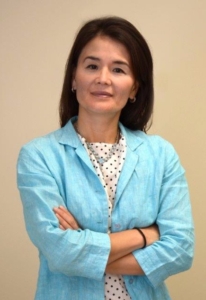INNOVATIVE GUT DISORDER RESEARCH RESTORES QUALITY OF LIFE FOR PATIENTS
Please note, FMT is not currently available in most healthcare facilities in Canada and is not approved outside clinical trials for IBD patients at this time.
Each year 40,000 Canadians suffer from recurrent Clostridium difficile or C. diff., a bacterial infection that can cause pain, diarrhea, and even death. C. diff. is usually treated with antibiotics, but they don’t work for everyone, especially when the infection recurs.
Island Health microbiologist Dr. Christine Lee and team are researching a better treatment for C. diff. and other chronic gut disorders: a new treatment called fecal microbiota transplant or FMT.
FMT transfers stool from a healthy donor to a patient’s digestive tract, and studies show that it’s 85% effective in curing recurrent C. diff.
 Dr. Lee’s FMT research began in 2008 when a 75-year-old man had a case of recurrent C. diff. that wasn’t responding to treatment. The only standard treatment option available was surgery to remove his colon, but Dr. Lee recommended FMT instead. Within 24 hours of receiving FMT, his symptoms had resolved and he had recovered. Since then, Dr. Lee has offered more than 2,000 FMTs to patients for clinical care or research.
Dr. Lee’s FMT research began in 2008 when a 75-year-old man had a case of recurrent C. diff. that wasn’t responding to treatment. The only standard treatment option available was surgery to remove his colon, but Dr. Lee recommended FMT instead. Within 24 hours of receiving FMT, his symptoms had resolved and he had recovered. Since then, Dr. Lee has offered more than 2,000 FMTs to patients for clinical care or research.
Given its effectiveness, Dr. Lee and her team are working to improve awareness of and access to FMT in BC and across Canada, and to investigate FMT as a treatment for diarrhea-predominant irritable bowel syndrome (IBS). They’re also researching which forms of FMT are most effective, accessible, and economical for recurrent C. diff. as well as for IBS.
Through several research grants and with the support of donors to the Victoria Hospitals Foundation, Dr. Lee’s future research will continue to focus on improving care and restoring quality of life for people with chronic gut disorders.
To learn more about the FMT program and current study opportunities, email Christine.lee@islandhealth.ca.




